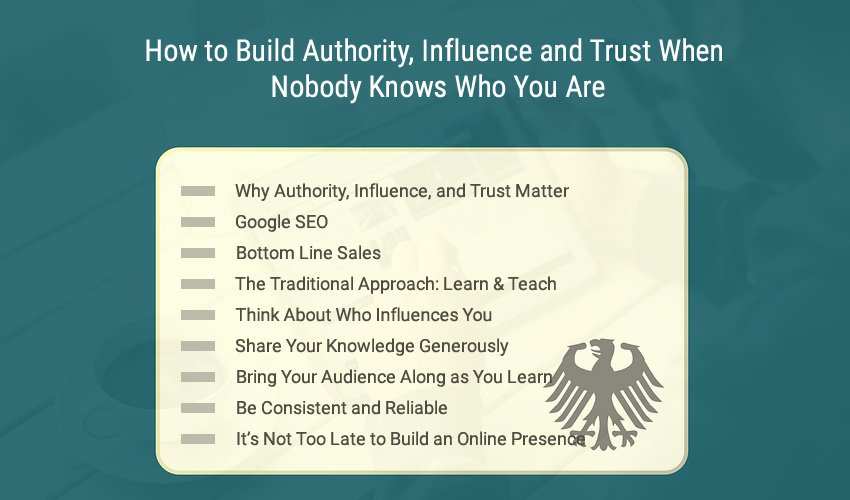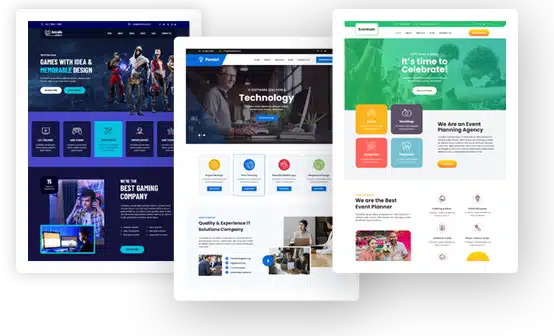How to Build Authority, Influence and Trust When Nobody Knows Who You Are

If you’re just beginning in online business, how do you get off the ground? A lot of business owners focus on creating content and getting traffic to their website, but that’s only part of the picture. The question is, once that traffic is on your site, how do you convince them to buy?
A large part of it is building authority, influence, and trust with your audience. They need to know you understand your stuff and that you’re trustworthy before they purchase from you.
But how do you do that when no one knows who you are? It might feel impossible, but it’s not. Here are the tips you need.
Why Authority, Influence, and Trust Matter
Why should you focus on building up trust, influence, and authority with your audience instead of spending time and money on more tangible marketing methods?
Part of the answer is that you do put resources into other digital marketing strategies. But you can’t overlook these vital factors. There are two main reasons why.
Google SEO
Everyone knows that a business needs excellent search engine optimization (SEO) before they can succeed in digital marketing.
Ranking highly on Google is essential to getting clicks and visitors to your website. Without that organic traffic, you’ll have a hard time making sales consistently.
One of the things that Google has been focusing on lately is Expertise, Authority, and Trust (EAT). If they can’t find signals that your EAT is strong in your industry, your webpage will not rank well. When you build up authority, influence, and trust, your EAT score will improve.
Bottom Line Sales
People do business with those they know, like, and trust. If you aren’t building a sense of authority and influence, you’re going to be very limited in the amount of business you do.
Very simply, these factors directly impact your entire sales funnel, influencing how people react to your marketing and whether they take action and move to the next stage of the process.
The Traditional Approach: Learn & Teach
The usual approach to building authority and influence is based on a simple principle: to be seen as an expert, you need to be an expert and display your knowledge as prominently as possible.
Folks taking this approach spend a lot of time learning everything they can about their niche. From there, they promote themselves and their knowledge wherever they can. This doesn’t have to be done in a bossy or overwhelming way; it can be very relatable.
Using the traditional approach means you focus on displaying your knowledge and becoming a significant voice in your industry. Show what you’ve achieved. Look the part and be confident.
If you don’t know everything yet or feel uncertain, proponents of this method will tell you to “fake it until you make it.” Act like you know, go find out the answer, and then you really will know!
While this is the traditional approach, other methods are just as effective – maybe more – and aren’t as prone to imposter syndrome or the feeling that you must know everything before you can act.
Think About Who Influences You
Another way to work on building your authority and trustworthiness involves thinking about who influences you. What do you find convincing? What catches your attention?
If you find videos quite persuasive and they help you feel that you know a person well, consider building video marketing into your strategy. Or, if you like stories within email marketing, consider using that.
When you think about what it takes for you to trust someone you’ve only just heard of, you’ll come up with a variety of strategies that you can use in your digital marketing and awareness campaigns. Think about which ones will work best in your industry and give them a try!
Of course, as with any marketing strategy, it’s essential to be consistent and do your best to track your results. Pay attention to how your company, brand, and name is being mentioned to see if you’re growing in influence and authority.
Share Your Knowledge Generously
One of the best things you can do to build others’ sense of your authority in a niche is to share what you know generously. What you know is important, but when it comes to influence and general likeability, being generous is the magic ingredient.
If you want folks to feel like they know, like, and can trust you enough to make purchases from you, it pays to share regularly and give a lot of information away for free. No matter how much you know – even if you don’t know it all – there’s someone who knows less and you can teach them.
For example, the founder of ProBlogger, Darren Rouse, started an online photography school despite not being an expert or a professional photographer. In the beginning, he simply focused on sharing generously with beginners.
Darren has also hired expert writers to share more than he could himself, creating a comprehensive resource for photographers that has become incredibly successful.
You don’t have to be an expert right away. Just share what you know, and as you learn more, share more.
Another key to sharing knowledge generously is to be transparent with what you don’t know. The honesty will help people trust you and it creates a deeper connection with your readers. Superhuman experts that are on a pedestal tend to push people away because they are unrelatable.
Bring Your Audience Along as You Learn
One of the most powerful methods of building authority when you’re first starting out is to take your followers along as you learn the ropes. You don’t have to spend a lot of time creating an aura of expertise – you can start right away.
Show your audience your lessons as you learn them. It makes you highly relatable and boosts your influence significantly. They know you understand what’s going on because they’ve walked with you as you learned it.
How do you engage in public learning?
First, consider doing interviews with experts in your field and publishing them. Not only will you learn, but you’ll also be building relationships with influencers in your niche.
These relationships will heighten your authority and your audience’s trust in you. Your followers will also enjoy hearing directly from titans in your industry!
Secondly, create projects or experiments to test theories or put what you’ve learned into practice. If you run a home repair business, do repair projects using specific materials or methods. If you run a marketing business, test promotion methods with specific blog posts and report how it worked.
You’ll learn a great deal, and your audience will as well. Talk about your wins, but don’t shy away from your failures. Someone who is transparent is relatable and you get more respect, not less, by showing that you’re human.
Finally, use yourself or others as case studies and share what you’ve learned. Consider reviewing someone else’s work in a positive, constructive way while giving tips and advice about what you’d change. This helps you show your expertise indirectly, rather than trumpeting it. You show you know things instead of just saying so.
When you take these steps, you’ll learn a great deal and build a loyal audience in the process. People will know where your authority comes from, and you’ll have a great deal of influence over them. They’ll trust you!
Be Consistent and Reliable
The internet is full of business owners who started strong and then faltered and disappeared. To build authority and trust, you can’t afford to do that. Don’t start with 20 online posts a day for a week and then disappear.
Instead, set a pace you can maintain for the long haul. Consider strategically what you can share and how often. It’s far better to build your brand by sharing one social media post a day for a year than to have a flurry of activity and then vanish.
Because so many businesses are “flash in the pan” short-term efforts, you may find that your audience waits awhile before committing to you. They’re trying to see if you’re the real deal or not. Once you’ve been consistent over time, they’ll commit to your story and begin engaging with your business.
Also, follow through on what you say you’re going to do. If you announce an interview, be sure to follow through. If you’re doing an experiment, follow through until the end.
Of course, you can’t be perfect. In those cases, share why you didn’t follow through and what you learned from it. But if this becomes a consistent pattern, don’t expect to build authority, influence, or trust for your business.
It’s Not Too Late to Build an Online Presence
Don’t feel like it’s too late because you didn’t start an online business in 2010. You can still be successful in 2020 and beyond. It takes dedication, consistency, and strategy, but with the tips above, you can certainly make it happen.
When you do, you’ll have a solid foundation of authority, influence, and trust that you can use to build your business for years to come.


